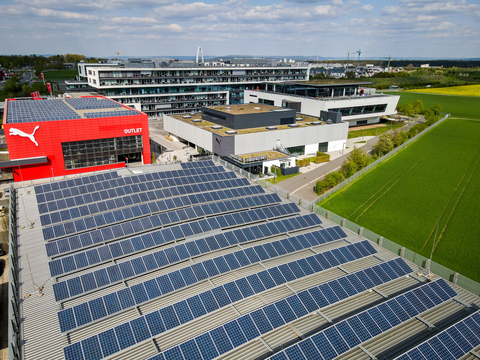PUMA Reduces Greenhouse Gas Emissions By 24% In 2023
HERZOGENAURACH, GERMANY--(BUSINESS WIRE)--
Sports company PUMA reduced its greenhouse gas emissions by 24% in 2023 compared to 2022, despite a strong sales growth.
This press release features multimedia. View the full release here: https://www.businesswire.com/news/home/20240313721861/en/

Sports company PUMA reduced its greenhouse gas emissions by 24% in 2023 compared to 2022, despite a strong sales growth. (Photo: Business Wire)
This was made possible by its core suppliers doubling their use of renewable energy in 2023 compared to the previous year, increasing the use of less carbon intensive materials in its products, the introduction of low carbon shipment tariffs by PUMA’s logistics partner Maersk, by using renewable electricity or purchasing renewable energy certificates at its own operations and by investing in electric vehicles in its car fleet. Compared with the 2017 baseline, this means an absolute greenhouse gas emission reduction of 29%.
“We are very proud of the progress we have achieved on our sustainability journey in 2023, particularly when it comes to the reduction of greenhouse gases,” said Anne-Laure Descours, Chief Sourcing Officer at PUMA. “We will not stop there, however, and continue to execute our FOREVER.BETTER. sustainability strategy and our 10FOR25 targets.”
With an 85% reduction of own emissions and a 65% reduction of supply chain emissions relative to sales, PUMA achieved its first science-based greenhouse gas reduction target in 2023, seven years ahead of the target year 2030. PUMA’s new climate goals, which were approved by the Science Based Targets Initiative (SBTi), aim to reduce PUMA’s emissions by what scientists say is necessary to keep global warming below 1.5 degrees. By 2030, PUMA aims to reduce its absolute Scope 1 and 2 GHG emissions by 90% from a 2017 baseline year. The SBTi has classified PUMA Scope 1 and 2 targets as in line with a 1.5-degree trajectory. By 2030, PUMA also commits to reduce absolute Scope 3 GHG emissions from its supply chain and logistics by 33% compared to 2017.
Apart from increasing its climate ambitions, PUMA also made progress with its other 10FOR25 sustainability targets, reaching two out of ten targets ahead of schedule.
PUMA met its Plastics and the Oceans target by eliminating plastic carrier bags from its owned and operated stores and through researching biodegradable plastic options. An important part of this target was PUMA’s successful RE:SUEDE experiment, where it turned an experimental version of its classic Suede sneaker into compost under controlled industrial conditions. A commercial version will be launched in April 2024.
It also achieved its Human Rights target by training more than 220,000 factory workers on women’s empowerment and completely mapping subcontractors and Tier 2 suppliers for human rights risks. In addition, PUMA employees donated over 57,000 of community engagement hours.
Other progress included scaling up the use of recycled materials in 2023, producing 8 out of 10 products with a significant part of recycled or certified materials. Starting 2024, all* of PUMA’s replica football jerseys will be made using PUMA’s RE:FIBRE recycling technology which focuses on polyester textile waste as the primary source of material.
PUMA’s sustainability report is available at https://about.puma.com/en/sustainability/reporting
*excluding any locally sourced kits and replicas for Al Hilal, Galatasaray SK, Fenerbahce, Shakhtar Donetsk
PUMA
PUMA is one of the world’s leading sports brands, designing, developing, selling and marketing footwear, apparel and accessories. For more than 75 years, PUMA has relentlessly pushed sport and culture forward by creating fast products for the world’s fastest athletes. PUMA offers performance and sport-inspired lifestyle products in categories such as Football, Running and Training, Basketball, Golf, and Motorsports. It collaborates with renowned designers and brands to bring sport influences into street culture and fashion. The PUMA Group owns the brands PUMA, Cobra Golf and stitched. The company distributes its products in more than 120 countries, employs about 20,000 people worldwide, and is headquartered in Herzogenaurach/Germany.
View source version on businesswire.com: https://www.businesswire.com/news/home/20240313721861/en/

Copyright Business Wire 2024
